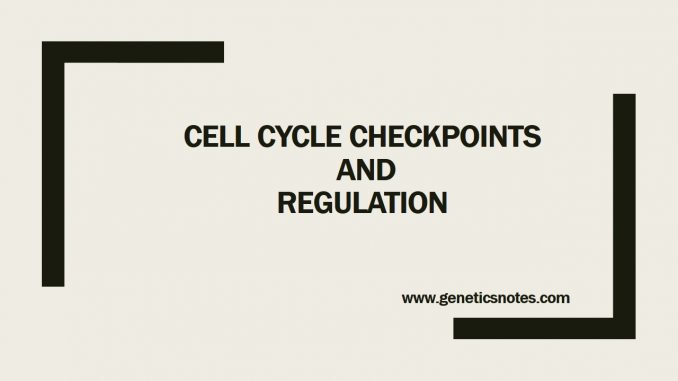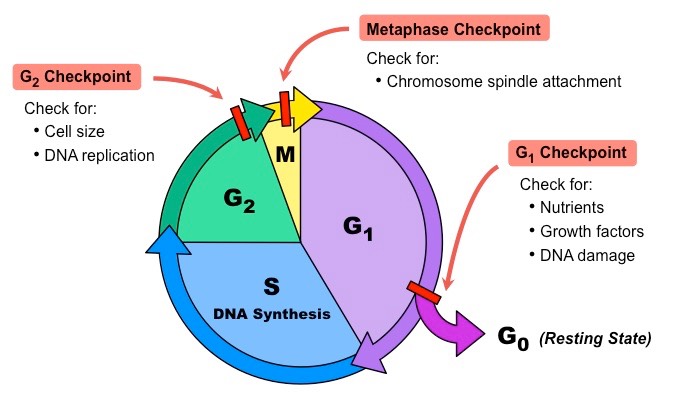
Checkpoints in cell cycle:
- As we know cells usually divide when they have doubled their content by volume, but actually the control of the process of cell division is very complex and occur precisely. All the process or steps of cell division occurs in sequence and also the cell know when to proceed and when to wait and stop cell division.
- A continuous cell division before DNA replication is completed or when chromosome or spindle fibers are damaged brings catastrophic consequences to cell or even organism. Therefore, every aspects of a cell is checked by its internal mechanism before proceeding to cell division.
- A checkpoint is one of several points in the eukaryotic cell cycle at which the progression of a cell to the next stage in the cell cycle can be halted until conditions are favorable.
- Numerous stops occur during the cycle to assess whether the next step should proceed or not and these stops are known as check point.
- A complex protein called Maturation promoting factor (MPF) have a significant role is cell maturation and mitotic division. It is also referred as mitosis promoting factor.
- MPF is composed of cyclin and cyclin dependent kinases, these two protein molecules are activated when combined together and are responsible for cell cycle to cross various checkpoints.
- In the cell cycle, there are three check points that involves cyclin-dependent kinases (cdks). Each cdk has its own specific cyclin that initiates either G1 phase, S phase, or M phase of cell cycle. Other check points that do not involve cdks also occurs at transition phases of cell cycles.
- Checkpoints in cell cycle is very important because it helps to halt the process of cell division if there is genetic damage, giving the cell to repair the damage before cell division. If the damage cannot be repaired then cell undergoes apoptosis and again if the check point mechanism is failed then cell become cancerous.
Various checkpoints in cell cycle:

i. G1 check point:
- The G1 checkpoint determines whether all conditions are favorable for cell division to proceed or not. Such as damage to DNA and other external factors of cells are evaluated at this checkpoint. If the conditions are inadequate, the cell will not be allowed to continue to the S phase.
- G1 checkpoint is also known as the restriction point at which the cell irreversibly commits to the cell division process. Cell set up certain requirements to be fulfilled by the cell to pass the check points.
- External factor such as growth factors play a vital role in carrying the cell past the G1 checkpoint. The cell will only pass the checkpoint if it has an appropriate size and has adequate energy reserves.
- At this point, the cell also checks for DNA damage.
- A cell that does not meet all the requirements will not progress to the S phase. Those cells halt the cycle and attempt to correct the problematic condition, or the cell may undergoes inactivation into G0 phase and await for further signals when conditions improve.
- If a cell meets all the requirements for the G1 checkpoint, the cell will enter S phase and begin DNA replication.
- This G1 checkpoint involves signaled by cyclins and cyclin dependent kinases (CDKs).
ii. G2 check point:
- The G2 checkpoint ensures all of the chromosomes have been accurately replicated and that the replicated chromosome is not damaged before cell enters mitosis.
- G2 checkpoint prevents the cell from entering into the mitotic phase if certain conditions are not met.
- If the checkpoint mechanisms detect problems with the DNA, the cell cycle is halted and the cell attempts to either complete DNA replication or repair the damaged DNA.
- If the DNA has been correctly replicated, cyclin dependent kinases (CDKs) signal the beginning of mitotic cell division
iii. M check point:
- The M checkpoint occurs at the end of the metaphase of mitosis.
- M checkpoint determines whether all the sister chromatids are correctly attached to the spindle fiber before the cell enters the irreversible anaphase stage.
- M checkpoint is also known as the spindle checkpoint because it determines whether all the sister chromatids are correctly attached to the spindle microtubules or not.
- At the end stage of metaphase, spindle fiber arising from opposite pole of cell attached to kinetochore of centromere of sister chromatid in equatorial plane. Then the cell enter into anaphase which is characterized by separation of sister chromosome toward opposite pole. Since anaphase is irreversible step in cell cycle, M phase check point is very crucial which ensure proper attachment of spindle to sister chromatids.
- M check point also involves signal from cyclin dependent kinases.
Regulation of cell cycle:
- The cell cycle is controlled by regulator molecules that either promote the process or stop it from progressing.
1.Positive regulation of cell cycle:
- Two groups of proteins; cyclins and cyclin-dependent kinases (Cdks), are responsible for promoting the cell cycle
i. Maturation promoting factor (MPF):
- MPF is composed of two protein complex; cyclin and cyclin dependent kinase (cdc2p).
- These two groups of proteins, called cyclins and cyclin-dependent kinases (Cdks), are responsible for the progress of the cell through the various checkpoints.
a. Cyclin:
- Cyclins are cell-signaling molecules that regulate the cell cycle
- There are four types of cyclins proteins- A, B, D and E
- The levels of the four cyclin proteins (A,B,D,E) fluctuate throughout the cell cycle in a predictable pattern
- Cyclin B is very important in mitosis.
- After the cell moves to the next stage of the cell cycle, the cyclins that were active in the previous stage are degraded.
- Cyclins regulate the cell cycle only when they are tightly bound to Cdks.
- To be fully active, the Cdk/cyclin complex must also be phosphorylated in specific locations.
b. Cyclin dependent kinases(CDKs):
- Cdks are kinase enzymes that phosphorylate other proteins or enzymes. Phosphorylation activates the protein by changing its shape.
- The proteins phosphorylated by Cdks are involved in advancing the cell to the next phase.
- The levels of Cdk proteins are relatively stable throughout the cell cycle; however, the concentrations of cyclin fluctuate and determine when Cdk/cyclin complexes form or not.
- The different cyclins and Cdks bind at specific points in the cell cycle and thus regulate different checkpoints.
2. Negative regulation of cell cycle:
- Negative regulators halt the cell cycle.
- Negative regulatory molecules are retinoblastoma protein (Rb), p53, and p21.
- If negative regulator proteins are damaged or become non-functional then it results in uncontrolled cell division leading to tumor or cancer.
i. Retinoblastoma proteins:
- Rb are a group of tumor-suppressor proteins common in many cells.
ii. P53
- P53 is a multi-functional protein. It is activated during G1 phase when there is DNA damage in the cell and cell employed the mechanism to repair the damage.
- When damaged DNA is detected, p53 protein halts the cell cycle and recruits enzymes to repair the DNA. If the DNA cannot be repaired, p53 can trigger apoptosis to prevent the duplication of damaged chromosomes.
- As p53 levels rise, the production of p21 is triggered.
iii. p21:
- p21 enforces the halt in the cell cycle dictated by p53 by binding to and inhibiting the activity of the Cdk/cyclin complexes.
- In case of DNA damage condition or inadequate cell size, more and more p53 and p21 are produced which halt the cell cycle and prevent the cell to enter S phase.
- These negative regulators are known as tumor suppressor protein and gene that codes for such proteins are called tumor suppressor gene.
- Tumor suppressor either halt the cell until repair or leads to apoptosis thus preventing damaged cell from division. If mutation occurs in tumor suppressor gene, then those negative regulator proteins lost the function to halt the cell cycle leading cancerous cell of continuous growth and division.
Importance of cell cycle checkpoints and regulation
- The cell cycle of each cell must be precisely controlled and timed to faithfully and reproducibly complete the developmental program in every individual. Each type of cell in every tissue must control its replication precisely for normal development of complex organs such as the brain or the kidney. In a normal adult, cells divide only when and where they are needed. However, loss of normal controls on cell replication is the fundamental defect in cancer.
- Cell cycle occurs with high accuracy and fidelity to assure that each daughter cell inherits the equal number of chromosome as of parent cell.
- Chromosome replication and cell division must occur in the proper order in every cell division. If a cell undergoes the events of mitosis before the replication of all chromosomes has been completed, at Ieast one daughter cell will lose genetic information.
- Similarly, if a second round of replication occurs in one region of a chromosome before cell division occurs, the genes encoded in that region are increased in number out of proportion to other. Therefore, single round of DNA replication occurs in a cell.
